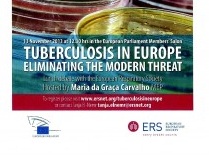
On 13 November, the European Respiratory Society (ERS) organised a lunch debate “Tuberculosis in Europe: Eliminating the modern threat” hosted by Members of European Parliament (MEPs) Maria da Graça Carvalho and Carl Schlyter in the European Parliament. The meeting was a good opportunity to review the situation of the TB epidemic in the region and take stock of the work of the European Institutions in the fight against the disease.
“In the period 2007-2013, the European Commission (EC) spent €188 million on Research and Development for TB drugs, vaccines and diagnostics: €72 million on projects financed directly by the 7th Research Framework Programme (FP7); €73 million from the European and Developing Countries Clinical Trial Partnership (EDCTP); and €43 million from two calls for proposals under the Innovative Medicines Initiative” said Dr Line Matthiessen, Head of the Infectious Diseases and Public Health Unit in the Directorate-General for Research and Innovation. While this is an increase from the previous seven-year period, MEP Schlyter stressed that the amount represented only five euro cents per European citizen per year.
Dr Matthiessen also presented the new Global TB Vaccine Partnership, an informal platform which aims to coordinate investments on TB R&D and gathers the European Commission, the European Investment Bank, AERAS, the TB Vaccine Initiative, EDCTP and the Bill & Melinda Gates Foundation. The partnership, which is still work in progress, aims at developing and managing a global portfolio to develop a new TB vaccine.
Others speakers, including Dr Mario Raviglione, Director of the Global TB Programme at WHO, and Dr Piotr Kramarz, Deputy Chief Scientist at the ECDC, agreed that European institutions have a crucial role to play in enhancing political and financial commitment to fight TB in Europe and globally. WHO Representative to the European Union, Dr Roberto Bertollini, suggested European institutions could also promote a functioning cross-border TB control programme which, through improved access to early TB diagnosis and increased continuity of care, could have an impact in alleviating the burden of drug-resistant TB in the region.
The TB Europe Coalition welcomes the ERS’ involvement in tuberculosis advocacy in the European region and looks forward to enhanced collaboration for better TB care and control in the region.
Source: TB Europe Coalition